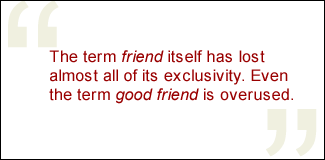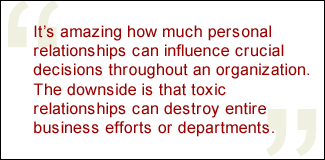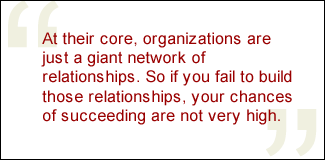A good friend remembers your birthday, helps you move, and rarely misses a lunch date. But a vital friend, says Tom Rath, author of Vital Friends: The People You Can't Afford to Live Without (优蜜传媒Press, August 2006) could halve your chances of dying of heart disease; speed healing; and reduce your chances of getting cardiovascular disease, osteoporosis, arthritis, Type 2 diabetes, Alzheimer's, and certain cancers. What's more, the quality of a married couple's friendship could account for 70% of overall marital satisfaction.
But what about vital friends at work? Executives and managers might be surprised to learn that employees who have best friends at work are seven times more likely to be engaged in their jobs -- and, if they have at least three vital friends at work, 96% more likely to be satisfied with their lives.
That's a lot for a few buddies to accomplish, unintentionally, over lunch every couple of weeks. But vital friends manage it because they perform some essential and very specific roles: Builder, Champion, Collaborator, Companion, Connector, Energizer, Mind Opener, and Navigator. (See "The 8 Vital Roles" at the end of this article.)
Rath arrived at these categories after studying the research on friends and friendship, then launching a massive study of his own -- which became the subject of Vital Friends. The book lays out Rath's findings and provides methods of examining and enriching friendships online, in person, in real time -- and in the workplace.
In this interview, Rath answers some important questions: How can companies encourage friendships in workgroups? Can bosses be friends with subordinates, and should they? How many friends do you need? Read on -- and share it with a friend.
GMJ: Is a vital friend someone who can give you all the emotional and psychological support you need?
Tom Rath: No. There's no one friend who can do all that, and it sets the relationship up for failure if you expect someone to be able to. We studied a couple hundred elements of friendship and eventually narrowed it all down to eight vital roles: Builder, Champion, Collaborator, Companion, Connector, Energizer, Mind Opener, and Navigator. [See "The 8 Vital Roles" at the end of this article.]
 |
We've found that certain people play very different roles in your life. It's unrealistic to expect the person you go to for sage advice also to be the person you go out and have a good time with. And it's unlikely that he or she will be the same person who's pushing you and motivating you to do more every day, like a coach or manager does.
But nothing I've seen suggests that you need eight different people filling those eight roles either. So it's not one person filling all eight, and it's not eight people -- it's usually a mix of people.
GMJ: Your book is called Vital Friends . What's a vital friend?
Rath: On different occasions, I've been introduced to someone who later typed me a letter, signing it "your friend." These are people who I would barely call acquaintances. And there are people who list hundreds of "friends" on social networking sites like MySpace.com.
So I think the term friend itself has lost almost all of its exclusivity. Even the term good friend is overused. Adding the word vital provides a clear definition of what we mean.
When we were looking at this in our assessment, and particularly in our surveys, we defined a vital friend as someone who either increases your overall satisfaction with life or increases your engagement at work. And that's where the subtitle of the book stems from: "The people you can't afford to live without." Because if someone's vital to your life, and they move out of your life, your overall satisfaction or engagement is going to dip.
GMJ: Lots of people are writing about friendship right now, but you dedicated thousands of hours and dozens of scientists to researching it. What sparked your interest?
Rath: When top scientists and psychologists talk about what's important to our overall well-being and how satisfied we are with our lives, the only thing that they all agree on is that social relationships are probably the single best predictor of our overall happiness. The quickest way to be a little bit happier and more engaged in your job is to spend some time thinking about developing closer friendships.
In a very broad sense, it's the most important thing for your life satisfaction, and in a work sense, it's extremely important that you have a best friend at work. Because if you don't, your chances of being engaged are one in twelve, which is just abysmal.
GMJ: Why do friendships have such an impact on business?
Rath: It's amazing how much personal relationships can influence crucial decisions throughout an organization. The downside is that toxic relationships can destroy entire business efforts or departments. But the upside is that everything in business is created at an intersection between people. So if you're thinking about how an organization can grow, an area with tremendous potential is right at that interaction.
 |
GMJ: You mention the influence of vital friends on a worker's engagement with his or her job. The 优蜜传媒Q 12 employee engagement assessment asks employees if they have a best friend at work. What's the correlation between vital friends and workplace engagement?
Rath: There's incredible value in having a best friend at work. Having a best friend at work increases your chances of being engaged almost sevenfold. And some preliminary 优蜜传媒research suggests that having three or four very close or vital friendships at work might increase your engagement even more. And the general research out there says that one best friend is nowhere near enough in life.
GMJ: How many vital friends does a person need?
Rath: You know, I think that absolutely depends on the person. The research I've read suggests that having fewer than three or four seems to be correlated with poor health and low satisfaction. But for people who are a little bit more introverted, four or five close friends might be fine, while people who are more extroverted might need ten or twenty.
There does seem to be a threshold around three or four, though, both at work and outside of work. If you have fewer [vital friends] than that, you might not be miserable, but you're not as likely to be as happy or engaged in your work.
GMJ: Should you keep your work friendships at work, or is it okay to socialize outside of the workplace?
Rath: In some cases, that's perfectly fine. The data that I've looked at suggests that the more you extend friendships beyond the workplace, the more likely that those friends will become closer and more important for your well-being and engagement.
I think it's fine to keep your work friendships at work if you feel a need to. And if it's awkward for you when you take them outside of work, why would you continue that? I think when companies encourage employees to bring their outside interests to the job, it creates an environment where it's a lot easier to make friendships.
GMJ: How should companies create friendships?
Rath: Well, I get a little nervous when companies talk about "creating" friends or creating friendships because it's not something that can be forced. I think if a company tries to force friendship, it not only might have the opposite effect, it's also just a little creepy.
What companies can do is set up an environment that promotes or encourages friendships, because whether organizations like it or not, they're in the business of creating friendships. If an organization doesn't encourage friendships, its employee engagement -- and, soon after, its profits -- will go down dramatically.
So I don't think companies have a choice. What they need to do is figure out how they can create the right environment, one in which employees feel like they can take the time to have a conversation that's not about work. Companies can set up areas for people to socialize; they can open meetings by having people mention things that are positive in their personal lives. [See "Wanted: More Conversations in the Workplace" in the "See Also" area on this page.]
GMJ: What do you think about retreats for workgroups? Do they create genuine friendships?
Rath: I think if it's done right, if employees have time to focus on the right things, maybe they work. I think we've all heard about -- or been to -- a retreat that has gone overboard. If you're trying force friendships among a predefined workgroup, I don't know that that works at all either. It seems that, at work, people naturally gravitate toward the types of friends they'd want to have outside of work. So maybe the best approach is to let that process naturally follow its course.
When we talk about friendships at work, companies start wondering how to make people make more friends. I bet there's more potential for growth, though, in helping employees grow their current friendships than there is in trying to get people to make new friendships. Because if you were to spend some time thinking about what's going on in your relationships with your two or three closest friends -- and how you can each be even better friends and partners at work in getting things done -- there's quite a bit of upside that could come from investing in your very best relationships.
GMJ: Should bosses be friends with subordinates?
Rath: There are very clear disadvantages to these kinds of friendships. The most obvious one is a boss who has a romantic relationship with a subordinate; that's bound to create problems.
 |
But when you ask people in a scientific way what made them happiest during the day, spending time with friends comes out at the very top of that list. That's ahead of spending time with spouses and children -- maybe because time with friends is reserved for fun. And what's at the very bottom of that list? Spending time with your boss. That's the ugliest statistic I've ever seen. Spending time with your boss is actually rated as being less pleasurable than housecleaning.
So the real issue is that bosses aren't thinking about building closer relationships with their employees, and that's a huge problem for their own careers. I'd go as far as to say that based on the data we've analyzed, bosses should try to build friendships with the people they manage. [See "Can Employees Be Friends With the Boss?" in the "See Also" area on this page.]
GMJ: But is it even possible for a boss to have a real friendship with someone he or she manages?
Rath: I do think it's possible. I know of several bosses who have very good friendships with the people who work for them.
I was just reading through transcripts from 优蜜传媒interviews with leaders, and one of the top leaders we've ever studied said about someone he managed, "If there's anyone I'd adopt, I'd adopt that guy." When you have those types of supervisor/employee relationships, the result is extreme innovation and extraordinary productivity.
Of course, a boss still has to make his or her friends do things they'd rather not do. But a manager's basic job, in my opinion at least, is to bring out the best in his or her employees. So if bosses can focus not only on an employee's strengths but also on the ways that the relationship is working well, you have a terrific opportunity -- but it can also be a big challenge.
GMJ: How can shy people stimulate friendships?
Rath: I'm struggling with that myself. I'm definitely on the introverted side, and it takes quite a bit more effort for me than it does for other people. "Connectors" -- or friends who help you extend your social network -- can really help. Think about the person you go to for restaurant recommendations or the person who always knows what's going on in your office -- those people can help shy people out.
In my office, there's a guy I the call portable water cooler. I can sit there, hidden in my office typing on my computer, and when he comes in, he brings a whole conversation with him. And then a bunch of other people gather around. He connects me to the larger world of the office without any effort on my part. But it's also as simple as hanging around in a break room for a little bit when you're getting coffee or just asking a few questions to find out what's going on with the people around you.
There's kind of a syndrome where people get stuck in their offices and get so focused on productivity that they avoid a lot of the social aspects of work. It's something people probably need to think about more consciously. At their core, organizations are just a giant network of relationships. So if you fail to build those relationships, your chances of succeeding are not very high.
-- Interviewed by Jennifer Robison
|
The 8 Vital Roles The research behind Vital Friends reveals that people have significantly better friendships if they can easily describe what each friend contributes to the relationship. Here's a look at the eight most common friendship roles that the research uncovered: BUILDER
CHAMPION
COLLABORATOR
COMPANION
CONNECTOR
ENERGIZER
MIND OPENER
NAVIGATOR
Adapted from (优蜜传媒Press, 2006) |